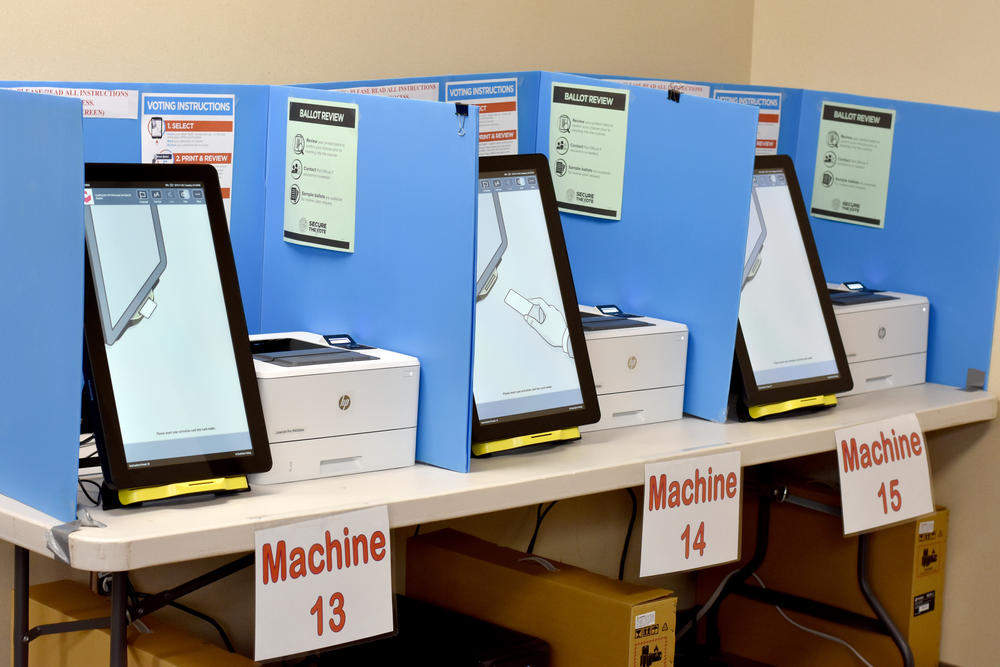Section Branding
Header Content
Could Coronavirus Affect Georgia’s Elections?
Primary Content
The spread of coronavirus is changing the way we vote in Georgia, coming at a critical time for elections officials.
Voters are being encouraged to use mail-in absentee ballots and the March 24 presidential primary is postponed until May. Counties also could face a shortage of poll workers as people choose to stay home for their health.
GPB All Things Considered anchor Rickey Bevington spoke with political reporter Stephen Fowler about what Georgians should expect when casrting their votes.
Rickey Bevington: Let’s talk about the short term. What is the latest information on Georgia’s presidential primary being moved?
Stephen Fowler: Over the weekend, Secretary of State Brad Raffensperger made the decision in consultation with the Democratic and Republican parties to suspend all voting and move the presidential preference primary Election Day to coincide with the next set of elections in May.
There’s a big concern about the spread of coronavirus. The latest guidance from the White House discourages gatherings of 10 or more people. Once you add up poll workers with a couple of people trying to vote, you’re over that limit!
Speaking of poll workers, that’s a big reason for this delay… the average age of a poll worker in Georgia is 70 years old, and they’re especially at risk of getting COVID-19 and having a more severe reaction.
Bevington: Stephen, hundreds of thousands of votes in the Democratic and Republican primaries have already been cast. What happens to those ballots?
Fowler: This is where Georgia’s new election system comes into play. The ballot-marking devices print out a paper ballot that has your selections, and that gets scanned and goes into a secure locked storage box.
County election officials are currently working to store and secure those boxes so the ballots can be tabulated in May when the rest of the election happens.
If you’re someone who’s voted already, you can still vote in the May 19 primaries for state and federal lawmakers. This voting system makes it possible that you will get a ballot that only has the races you haven’t yet voted in.
So Rickey, if you didn’t vote in March, your ballot will have the presidential contest for the party you select as well as the other primary races. If you did vote in March, then your ballot will have everything but the presidential race.
Bevington: There are still two big election cycles in Georgia this year, and turnout was expected to be high. Has coronavirus changed that outlook?
Fowler: Before voting stopped, the turnout in the presidential primary was actually higher than it was in 2016. So a lot of people are interested in voting this year, and there’s no indication that goes down. But how they vote could change. People who show up on Election Day could now try to vote during the three-week early voting period when there are fewer people, and those who use early voting could now decide to vote absentee by mail.
Bevington: And the secretary of state’s office is actually encouraging people to vote by mail in the next election, right?
Fowler: Exactly. Currently, anyone and everyone who wants to vote by mail can request an absentee ballot application, send it in, get an absentee ballot and vote that way.
The state is looking at maybe making that easier by sending out those applications automatically to voters over 60 – or even one to every registered voter that is pre-filled out with all of their information.
Now, I’ve talked with local officials who are also working to make sure the polling places are sanitary and the poll workers and voters are protected from spread. There are special instructions for sanitizing BMDs, extra hand sanitizer out places and more encouragement for people to stay home if they’re not feeling well.
Bevington: Finally, what kind of impact could we see looking ahead to the November election?
Fowler: Georgia’s 159 counties are not set up to do a primarily mail-based election, but this is where the new voting system can help. Both mail-in absentee ballots and the BMD’s paper ballots are counted and stored using a scanner.
There also may be a shortage of poll workers unless more people who are healthier step in for Georgians who are at risk.
Some polling places could close or change if local officials don’t feel comfortable having voting in, say, a senior center or a school.
It’s also important to remember that an election is really a months-long process, from creating the ballot with all the candidates included to the final counting of votes on Election Day. As voting behavior shifts and counties adapt, patience will be a key part of keeping the wheels of democracy turning.



